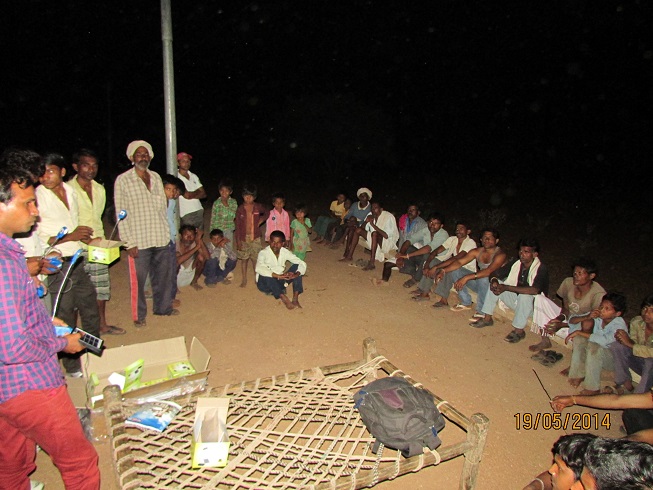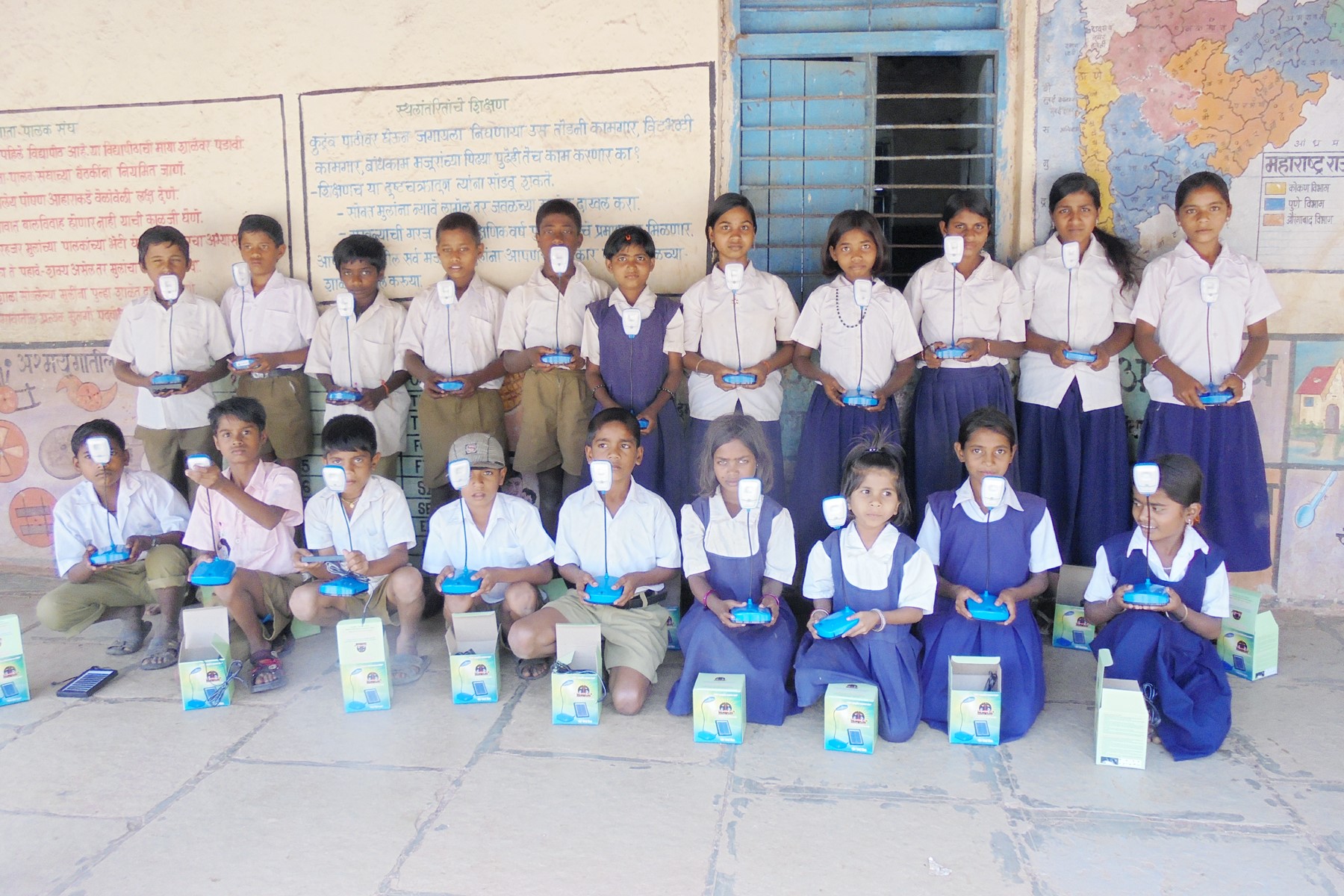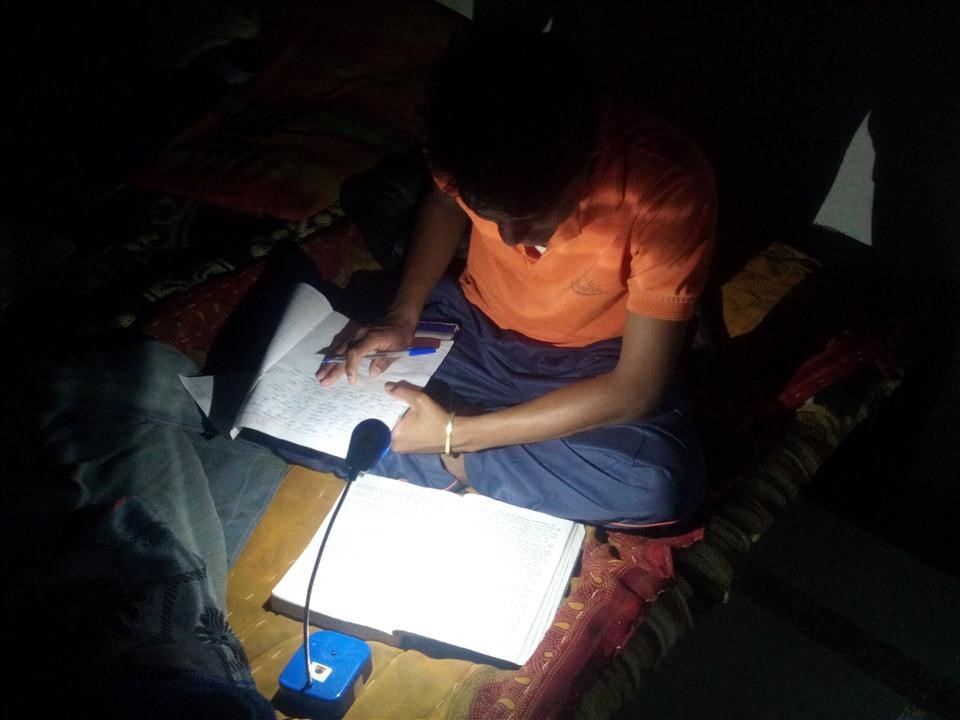Million Solar Urja Lamp (SoUL) Program
…to guarantee clean light to school children in rural India in fastest possible way & in a
cost-effective manner
by Indian Institute of Technology Bombay (IITB)
India has one of the youngest populations in the world, with 350 million children less than 14 years of age. School education is thus essential for future of the country. However, still 300 million people residing in India are without access of electricity and many more with poor quality of supply (IEA, World Energy Outlook, 2015). Many young students going to school either do not have access to alternate light source or suffer from erratic supply of electricity,both of which affect their study during evening hours. In order to provide light for 4 hours every evening for study purpose requires only 0.7 kWh of electricity per year! Alongside Right to Education, therefore it is desirable to provide Right to Clean Light. Thus, there is a need for a countrywide, self-sustainable solar lamp program.
The objective of the Million SoUL Program is to provide clean light for study purpose to each and every child in the country, in the fastest possible way and in the most cost-effective manner.
A countrywide large-scale solar lamp program must address, simultaneously, the issues of Scale, Speed and Skill. IIT Bombay has developed one such model, the Million Solar Urja Lamp (SoUL) Program that focuses on the localization of solar energy. In this model, local people are engaged in assembly, distribution and repair & maintenance of solar study lamps. In order to achieve scale, the model is designed such that it can be replicated in multiple blocks, across districts and states in parallel. To achieve speed, assembly and distribution in any intervention block is stipulated to be completed in 90 days. In order to target skill development, rural people are trained in assembly, distribution and repair of these lamps in their vicinity.
The Million SoUL Program (MSP) developed by IIT Bombay had clearly demonstrated the required scale, speed and skill to expand this program in the entire country. IIT Bombay was the central coordinating agency for this program. The MSP had integrated IIT Bombay’s technical expertise in solar technology, operations and analysis of socio-economic impact of the program. Assembly-cum-distribution centers were established at the block level, in premises of partnering NGOs. Locals from intervention blocks were hired and trained to assemble high quality solar study lamps and to campaign and distribute lamps to the target beneficiaries (i.e. school students enrolled between classes 5th to 12th). The components for assembly of these lamps were sourced from 4 different vendors, and supplied directly at the assembly centers. At these centers, these disassembled components were assembled into Solar Urja Lamps (SoULs).
Quality of solar study lamps was ensured through rigorous testing, both before and after assembly. SoULs were then sold at subsidized cost to students with schools as a medium of distribution, selling one lamp per school child. Saturation of the block was aimed by providing solar study lamps to minimum 75% of enrolled student in intervention blocks. Basic information about every beneficiary was recorded. Further, Service Repair Centers (SRCs) were set up in intervention blocks to ensure long term use of SoULs and sustainability of this initiative. This repair service facility was provided for free to students for one year (after distribution). Although per lamp cost was INR. 500, but financial aid provided by Ministry of New & Renewable Energy (MNRE) and philanthropic partners had facilitated in providing solar study lamps to the beneficiaries at a subsidized price of INR. 120.
One million SoULs were distributed in four Indian states of Madhya Pradesh, Maharashtra, Rajasthan and Odisha, covering 23 districts, 97 blocks and more than 10,900 villages. There are 54 assembly and distribution centers and 350 SRCs in operation, with training provided to 1,409 local people. While implementation of this program, 7,35,000 lamps were distributed in just 9 months between July 2014 to March 2015, while remaining 2,65,000 lamps in 4.5 months, i.e. from November 2015 to March 2016. MSP has focused on reaching most marginalized population, as amongst its intervention blocks 77 percent were tribal blocks (as defined by Ministry of Tribal Affairs) , while 83 percent were educationally backward blocks (as defined by Ministry of Human Resource and Development).
The impact analysis of the MSP revealed that SoULs have replaced one kerosene wick lamp in beneficiary households, thus contributing to saving in kerosene used for lighting. Besides, its usage for study purpose, it was an aid in various other activities like domestic chores (like cooking, washing utensils etc.); carrying out livelihood activities (like irrigating farms during night, plucking flowers during early morning hours, in grocery shops etc.); mobility during the dark hours and emergencies (like taking patients to the hospital etc.).
MSP in Numbers
| Implementation Period February 2014 to March 2016 | |
| Beneficiary students covered | 1,000,000 |
| Number of states with SoUL presence | 4 |
| Number of blocks with SoUL presence | 97 |
| Number of villages with SoUL presence | 10,900+ |
| Local people trained | 1,409 |
| Repair centers established | 350 |
| Assembly and Distribution Centers | 54 |
| Saturated blocks | 37 |
| Institutional Partners | 9 |
| Vendors | 4 |
Some videos on the Million SoUL programme from here
Our Goals and Achievements – Million SoUL
What Million SoUL?
Unnat Bharat Abhiyan – Million SoUL
Tribal Coaching Centre – Pondikote, Odisha
Check out: EAI Consulting for Solar Energy – Solar PV & Solar Thermal







